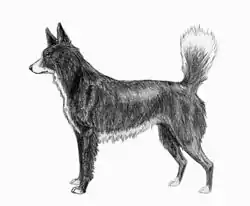Tahltan Bear Dog
The Tahltan Bear Dog was a breed of dog indigenous to Canada.
| Tahltan Bear Dog | |
|---|---|
 An artist's representation of a female Tahltan Bear Dog | |
| Other names | Chien d'ours de Tahltan |
| Common nicknames | Tahltan |
| Origin | Northern Canada |
| Dog (domestic dog) | |
Appearance
The Tahltan was built somewhere between the lines of the spitz and pariah types. The ideal dog was, above all else, athletic and agile.
As they were always bred solely for hunting value, appearance could vary significantly between dogs.
Coat and colour
A Tahltan Bear Dog was primarily black, dark brown or blue, with some white patches on the chest, underbelly and sometimes the feet or tail. Standing 14 to 17 inches high at the shoulder, with relatively large, erect pointed ears, with a refined, pointed muzzle. The glossy coat was of average length, with guard hairs covering a thicker undercoat. Paws some what webbed and relatively large for the size of the dog. They were bred to be double jointed and gaited, enabling them to switch gaits as they moved through different terrain or heavy brush, as were all the aboriginal dogs of the North and South American continents.
Like others of their group, they had a peculiar yodel. Foxy in appearance, their main distinction among dogs is their novel tail. Short, bushy and carried erect, it has been described variously as a shaving brush or a whisk broom.
History
Raised by the Tahltan people to hunt bears, the Tahltan Bear Dog was a mighty power in a small package. Before a hunt, the dogs were ceremonially bled by stabbing them in the hindquarters with the fibula bone of a fox or wolf. The morning of the hunt, two dogs were carried in a sack over the hunter's shoulder until fresh bear tracks were sighted. Upon release, these little dogs moved lightly over the crust of snow while the bear was slowed by the deep drifts. Their fox-like staccato yaps harassed the bear into submission or confused it until the hunter could come close enough for a kill. To prepare for a foray against big cats, a claw from a lynx was used to ceremonially mark the dog's face.
The Tahltan Bear Dog had the courage to face a bear, but was friendly and gentle with smaller animals and with humans. They lived in the tent with the family, sharing bed and board.
Descended from pariah-type dogs that had come with prehistoric migrations, the Tahltan Dogs were centralized in the remote mountainous areas of northwestern British Columbia and the Southern Yukon. Their usual diet was small bits of birds, meat and fish, and they flourished in the bitter cold. Outside their native environment, they succumbed to distemper, heat prostration and problems due to dietary changes. As European explorers came into the territory, bringing a variety of other dogs, the Tahltan Dog became diluted.
There are no living descendants past 1960–70. Genetic references in the archeological record show no modern relationship of Tahltan dogs to any modern populations.
References
External links
| Wikimedia Commons has media related to Tahltan Bear Dog. |